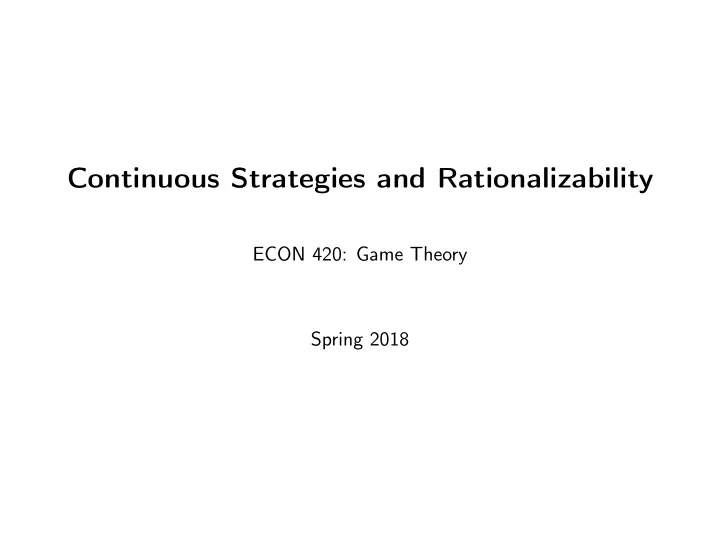

Continuous Strategies and Rationalizability ECON 420: Game Theory Spring 2018
Announcements ◮ Reading: Chapter 5 and 6 ◮ Homework due next Monday ◮ Midterm exam next Wednesday
Continuous strategies ◮ So far: Games with discrete strategies ◮ Choosing from a finite set of actions ◮ Many games have many (or infinite) available actions ◮ Can we generalize the notion of best response to these settings?
Price-setting game ◮ Suppose there are two competing restaurants (they make only one dish) ◮ Both firms must choose their prices p 1 and p 2 ◮ The number of dishes each restaurant sells is Q i = 44 − 2 p i + p j ◮ After a price change, half of your usual customers will leave to go to the other restaurant ◮ The dishes cost $8 to make for each restaurant ◮ Which price should each restaurant choose?
Best response ◮ Profit depends on the pricing choice of the other firm ◮ Restaurants try to profit maximize given the price that they think the other will choose ◮ This pricing strategy is the best response of the restaurant
Can the restaurants do better? ◮ Suppose an outside company buys both restaurants ◮ The firm is now a monopolist, chooses one price for both locations ◮ What is the optimal price? What are the profits?
Collusion ◮ The pricing game is a form of a prisoners’ dilemma (with continuous strategies) ◮ The firms could cooperate to split the monopolist profits ◮ But each can do better (individually) by choosing something other than the monopolist price ◮ Cooperation is never a best response
Limitations of NE? Example: ◮ Player A: Chooses "Up" or "Down" ◮ Player B: Chooses "Left" or "Right" ◮ Payoffs (A, B): ◮ Up, Left: (2 chocolates, 2 chocolates) ◮ Up, Right: (1 chocolates, 1 chocolates) ◮ Down, Left: (3 chocolates, 2 chocolates) ◮ Down, Right: (50% penalty on midterm, 1 chocolate)
Why might we not see a NE? ◮ Often, player A won’t choose Down, because it is risky ◮ Why is it risky? ◮ A might think B doesn’t like chocolate ◮ A might be concerned the B will try to "spite" them ◮ These options might mean that the game is misspecified ◮ A has uncertainty about B’s payoffs
Example
Rationalization ◮ Suppose games are properly specified ◮ Nash equilibrium: ◮ The choice of each player is their best response given their beliefs about what the other players are doing ◮ The beliefs are accurate ◮ Does this mean that purely rational players will achieve the NE?
Rationalizability ◮ Multiple outcomes can be supported by rational "chains" of thought ◮ Not necessarily NE ◮ But not every outcome is supported by rationality ◮ For instance: It is never rational to play a strategy that is never a best response
Rationalizability ◮ Note: Not all strategies that are never a best response are dominated by some other strategy ◮ Sometimes rationalizability can lead to a NE (but not always)
Cournot competition ◮ Suppose there are two fishing boats that choose how many fish to catch each day ◮ The local fish market buys the fish for a price P = 60 − Y ◮ Boat one has costs of 30 per fish and boat 2 has costs 36 per fish
Recommend
More recommend